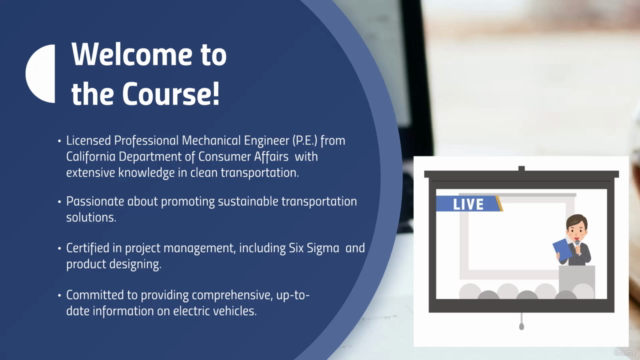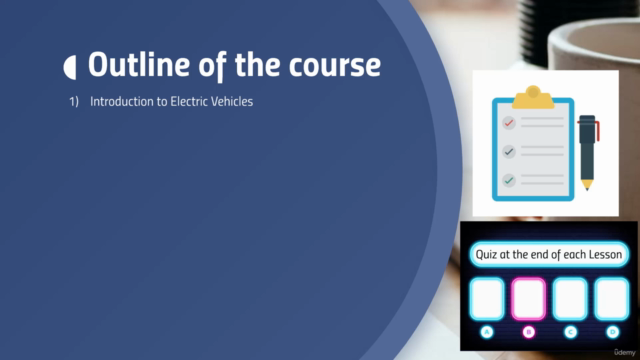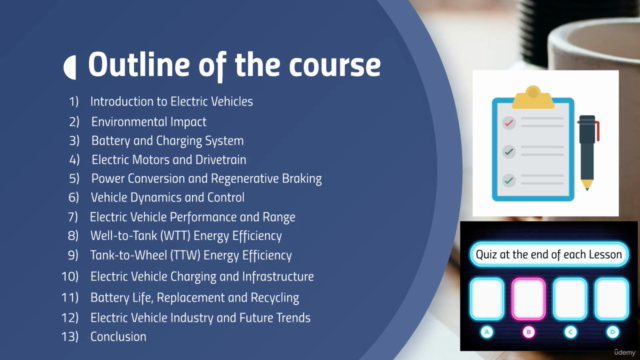Learn the Basics of Electric Vehicles: A Beginner's Course

Why take this course?
based on the detailed course outline provided, here's how you might present this information in a structured format for your learners:
Course Title: Comprehensive Guide to Electric Vehicles: Understanding EV Technology and Performance
Target Audience: Automotive enthusiasts, professionals in the automotive industry, environmentalists, students of mechanical or automotive engineering, policymakers, and anyone interested in learning about electric vehicles.
Course Description: This course is designed to provide a thorough understanding of electric vehicles (EVs), from their history and types to the specifics of battery systems, motors, and drivetrains. It covers environmental impacts, performance metrics, charging infrastructure, and the future trends of the EV industry. Whether you're looking to transition into the automotive field, are a curious consumer, or simply want to stay informed about sustainable transportation, this course will equip you with the knowledge you need.
Course Outline:
-
Introduction to Electric Vehicles
- Definition and brief history
- Types of EVs and comparison with traditional vehicles
- Advantages and disadvantages of EVs
- Components unique to electric vs. internal combustion engine vehicles
-
Environmental Impact of Electric Vehicles
- Emissions comparison with traditional vehicles
- Lifecycle analysis of EVs
- Reduction of greenhouse gas emissions through EV adoption
-
Battery System
- Types of batteries and their chemistry
- Battery construction, selection, and sizing
- Battery Management Systems (BMS)
-
Electric Motors and Drivetrain
- Different types of electric motors
- Operating principles of EV motors
- Components of the EV drivetrain and comparisons with traditional systems
-
Power Conversion and Regenerative Braking
- Power conversion processes in EVs
- How regenerative braking systems work
- Role of Energy Management Systems (EMS)
-
Vehicle Dynamics and Control
- Characteristics of EV dynamics
- Motor control strategies
- Vehicle stability and traction control systems
-
Electric Vehicle Performance and Range
- Factors influencing vehicle range
- Understanding battery capacity, energy consumption, and efficiency
- Energy management for optimal performance
-
Well-to-Tank (WTT) and Tank-to-Wheel (TTW) Energy Efficiency
- Definition and importance of WTT and TTW efficiency
- Calculation of energy efficiency for gasoline and electric vehicles
- Factors impacting energy efficiency
-
Charging and Infrastructure
- Types of charging stations, speeds, and networks
- Connectors and compatibility issues
- Home charging options and considerations
-
Battery Life, Replacement, and Recycling
- Acknowledging factors that affect battery life and replacement needs
- The process of recycling and disposing of used batteries
-
Industry and Future Trends
- Government policies and incentives supporting EV growth
- Technological advancements in EVs
- Insights into EV ownership, maintenance, and future outlook
-
Conclusion
- Summarizing key takeaways
- Encouraging further exploration and investment in EV technology
This course does not cover advanced topics like electric vehicle cybersecurity, autonomous driving systems specifically designed for EVs, or hyper-specific engineering details of cutting-edge EV components. Those interested in such topics may want to explore specialized courses or literature that delves deeper into those subjects.
Who Should Attend? This course is suitable for a wide range of learners, from the layperson curious about EVs to professionals in automotive design, engineering, and policy-making. If you're looking to gain a solid foundation in electric vehicle technology and its implications on society and the environment, this course is for you.
To market this course effectively, you can highlight the comprehensive nature of the content, the expert instructors involved, and the real-world applications of the knowledge imparted. Offer testimonials or case studies from previous participants to illustrate the value learners will gain from attending.
Course Gallery




Loading charts...